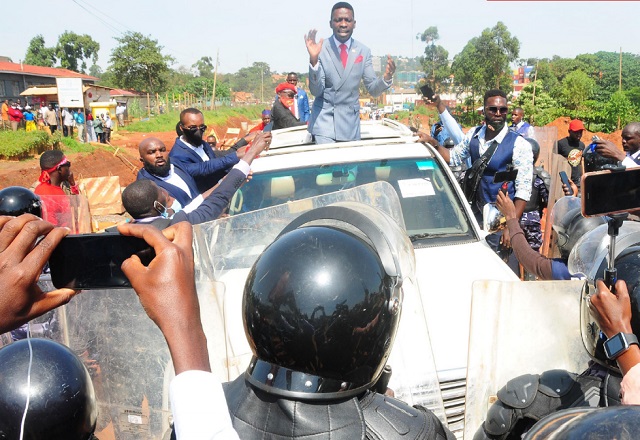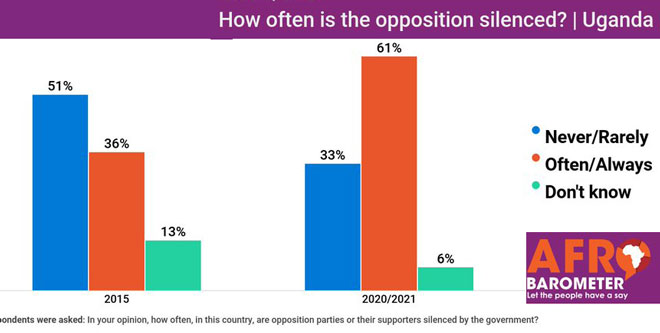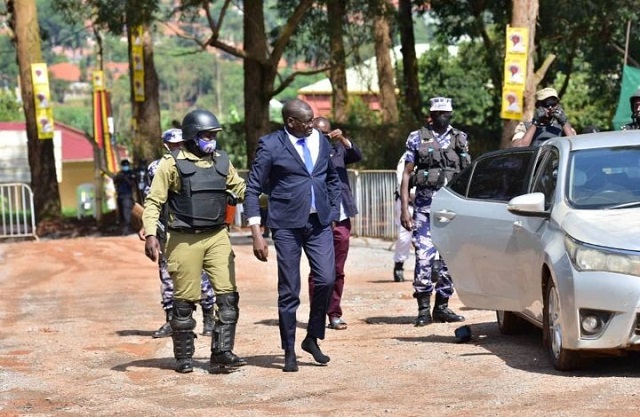
This time, however, in Luweero District proper, all four MP slots went to members of Bobi Wine’s NUP. They defeated NRM household names like Minister of Higher Education, John Chrysostom Muyingo. Former Minister of Finance, Syda Bbumba, Charles Nsereko; the husband of NRM Treasurer Rose Namayanja were defeated in other parts of the area.
At the presidential level in the area, Museveni got only 28% of the vote against Bobi Wine’s 71%. The question being asked is why Museveni’s brother, Gen. Salim Saleh who is always camped in the area, could not deliver the votes the way he allegedly did in northern Uganda?
Museveni also lost 25 of his ministers or about 30% of his cabinet. Those swept by the ‘Umbrella wave’ included Museveni’s long-serving ally in Buganda, Vice President Ssekandi and the NRM government’s powerful Chief Whip, Ruth Nankabirwa.
While Museveni’s NRM party lost ground in parliament, the opposition led by Kyagulanyi’s party gained. The incoming parliament will have about 110 opposition MPs compared to the 57 that were in the last parliament. That is partly because the number of seats has been increased from 426 in the 10th Parliament to 528 in the incoming parliament. The NRM had 293 seats in the out-going parliament which is about 69% control. The opposition had only 13%. The rest went to Independents and the military. Now the NRM has 316 MPs which is about 60% and a drop of 9 percentage points. The opposition has 21% of MPs which is a rise of 8 percentage points. And the number of independents has also gone up.
Museveni losing popularity
More troubling for Museveni should be a realisation that the latest drop in his popularity is not a one off. It is a trend that has been going on since 1996. Over this period, Museveni’s support has declined by about 15 percentage points. But the real vote numbers tell a grimmer story for Museveni.
His support has stagnated at about 6 million voters even as the population of Uganda has risen from 15 million in 1986, 24 million in 2001, 40 million in 2016, and 46 million in 2020.
In the latest election, Museveni once again failed to raise the number of people who actually voted for him. Only 5.85 million out of 18 million registered voters went for the president. In 2016 up to 5.97 million people voted for Museveni. Significantly, however, the total registered voters in 2016 were 15.3 million. In 2021 they were 18.1 million. If 60.62% of those had voted for Museveni this time as they did in 2016, Museveni should have got at least 10 million votes instead of the approximately 6 million votes he got.
In fact, Museveni has since 1996 failed to raise the number of votes he wins above 6 million. In 1996 Museveni won with 4.45 million votes out of 8.5 million registered voters which was about 52% of registered voters. In 2011, total registered voters were 14 million and 5.4 million people voted for Museveni. That is about 39% of registered voters. In 2016, registered voters were 15.3 million and 5.97 million voted for Museveni which is also about 39%. That means Museveni’s vote tally was steady between 2011 and 2016. In the latest election, however, it declined dramatically. Out of 18.1 million registered voters, only 5.85 million or just 32% voted for Museveni.
Bobi Wine vote suppressed?
Museveni must have been keenly aware of these numbers. Museveni and his allies must also have been keenly aware that Bobi Wine’s votes as announced the Electoral Commission were probably grossly suppressed.

An opinion poll released by the pan-African agency, Afrobarometer, just days to the elections showed that only 18% of registered voters said they intended to vote for Bobi Wine and only 21% expected him to win.
For Museveni, 53% registered voters said they intended to vote him and 57% said they expected him to win. (POLL: 66% of Ugandans don’t trust EC results)
Significantly, however, up to 22% registered voters refused to answer and 10% said they did not know who would win. In the end, Museveni won with 59% of the vote and Bobi Wine got 35%. This shows that the Afrobarometer survey was relatively accurate in the case of Museveni and totally off in the case of Bobi Wine. But that is until the “silent” group that refused to answer is factored in. It appears many of these were in fact secret Bobi Wine voters. So why were they shy to announce their support for Bobi Wine? According to many commentators, they were afraid of being harassed by security agents.
Although Election Day Jan.14 and its aftermath were peaceful, the days leading to the election were filled with scenes of wanton brutalization of opposition candidates and their supporters.

The FDC presidential flag-bearer, Patrick Oboi Amuriat and Bobi Wine were brutalized as the Electoral Commission Chairman, Simon Byabakama, watched at the nomination venue in Kyambogo, Kampala. Amuriat ended up being nominated without his shoes on and became the “barefoot” candidate. Bobi Wine was roughly bundled into police cars in what was the start of a violent campaign.
During the campaign proper, teargas and live bullets accompanied them wherever they went. Bobi Wine agents, including his personal bodyguards were beaten, arrested, and some killed. People died in Amuriat’s convoy, mostly in motor accidents as they attempted to dodge security barricades.
Fear of violence could also possibly explain why the 2021 election had a very low turnout of voters at 58%. In 2016, voter turnout was 68%, in 2011 it was 59%, and in 2006 it was 70%. Voter turnout was low in 2011 because it was possibly among the most violent elections, according to most observers. Now it appears 2021 has taken that title. The Afrobarometer survey put fear of political intimidation or violence among respondents at 37% in the run up to the 2011 elections, 49% in the 2016 election, and 51% in 2021. The number of respondents who said the opposition has been silenced doubled from 36% in 2015 to 61% in 2021.
Many commentators also argue that without the intimidation and brutality of the security agencies, voter turnout and Bobi Wine’s vote tally and that of other opposition candidates would possibly have been higher. That is what they mean when they say Bobi Wine’s vote was suppressed.
Earlier reports by another firm, Research World International had shown that Bobi Wine was favoured by voters in Central, Kampala, and eastern regions. And the final results reflected that in Buganda but only slightly in Eastern Uganda.
On the other hand, Museveni’s vote tally appears to have been inflated. It is not clear if videos of people busy ticking ballots in secret locations and stuffing them in ballot boxes that have been circulating are authentic. But they add to stories that ballot stuffing was rife, especially in Museveni strongholds. On Jan.19 the Daily Monitor newspaper ran a story titled “How ballot stuffing was detected in Sembabule.” The story said during tallying at the district headquarters, the total votes cast were higher than registered voters at about 10 polling stations. Up to 6,322 votes were set aside to allow the numbers to match. Sembabule is a Museveni stronghold which had the President’s brother on the ballot although he withdrew at the last minute.
 The Independent Uganda: You get the Truth we Pay the Price
The Independent Uganda: You get the Truth we Pay the Price



If MUSEVENI stole our votes of which we had given to mister kyagulanyi then let him perish before 2026 because we are suffering alot in his regime
Tumbavu let museven role
Then, when us are suffering
he knows those are fake results
Has there been a study categorizing public and private sector over their opinion with regards to the above parameters? Those who feel safe with current government could be mostly in public service, have accumulated wealth and are consolidating their investments linked to government. However, the unsafe population would be majorly from the private sector, young people and SMEs without downstream government intervention. Personally, I wouldn’t attribute Mr. Kyagulanyi’s performance in the elections to outright power to command support hadn’t their been contributing factors that enabled swing voters go to him. The mistake, just like it’s being reiterated by many NRM supporters about Buganda being tribalistic in the recent voting, is intentionally hurting/suppressing people without regard to NRM sympathizers. Scenes caught on camera draw attention and much as we may sympathize with a trained police officer who is hit by a hammer, there will be biased judgement if we are shown a trained military man hitting a boda boda man standing besides his motorcycle or hitting boys moving in a line with raised hands, thus the shift in mind. Demonizing a region doesn’t improve popularity, otherwise people become immune to insults and can’t win their favor “democratically”.
congratulations love your comment hop if all were to think like thee we would mean the peace politicians stressed god bless
Game is over. We only pray and demand that Museveni be renewed to younger age to enable Him on stunning ground lead for 54 years. Bobi Wine is only to feature to drunkard and marijuana smokers in Buganda but not Uganda.
Additional statement: escapes votes to opposition is only because of neglected private sectors in lockdown period Bobi wouldn’t have even reached a quarter of Musevenis’ votes. I thus see that what IDD Amin did to the world is enough.
Let all ugandans who are oppositions wake up for the next incoming election 2026,b’se all every thing is by forces.we need freedom by all means wherether your weak or srong,lame or not,dull or bright,let the ugandan military officers stop thretenning ugandans from voting opposition candidates.
Then, when us are suffering